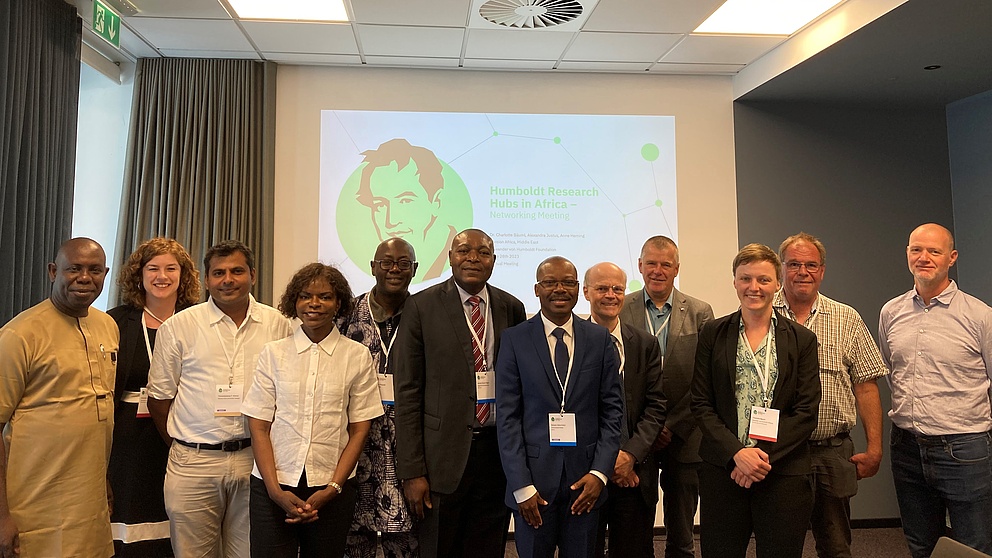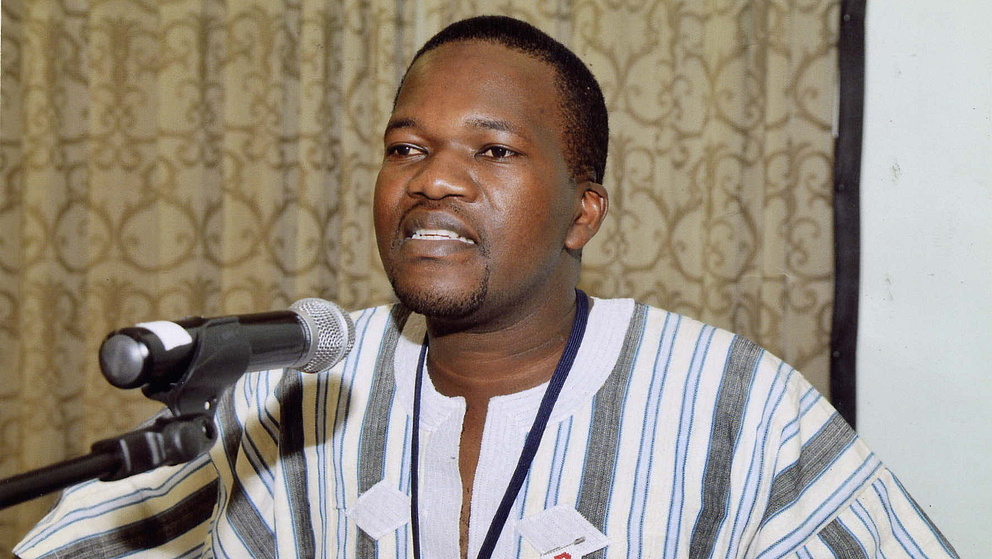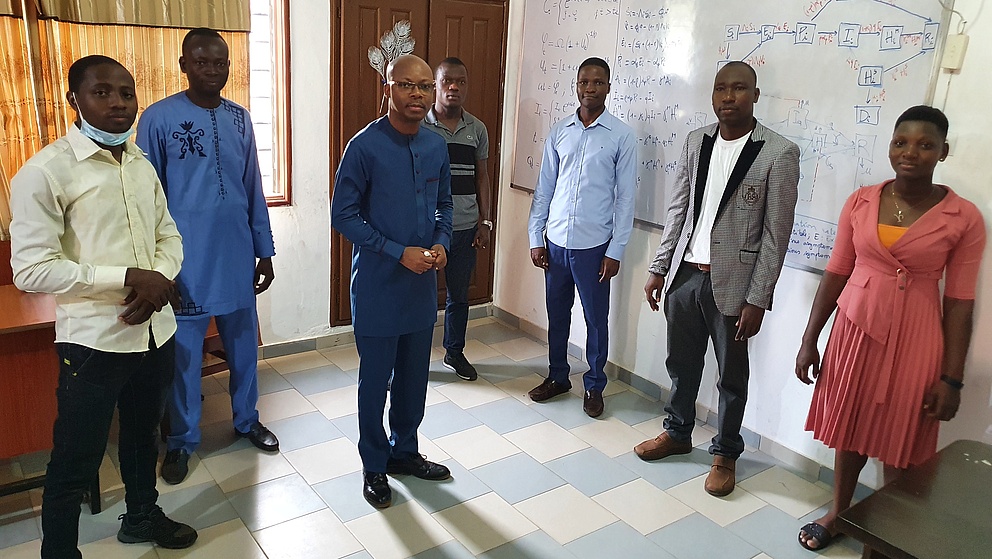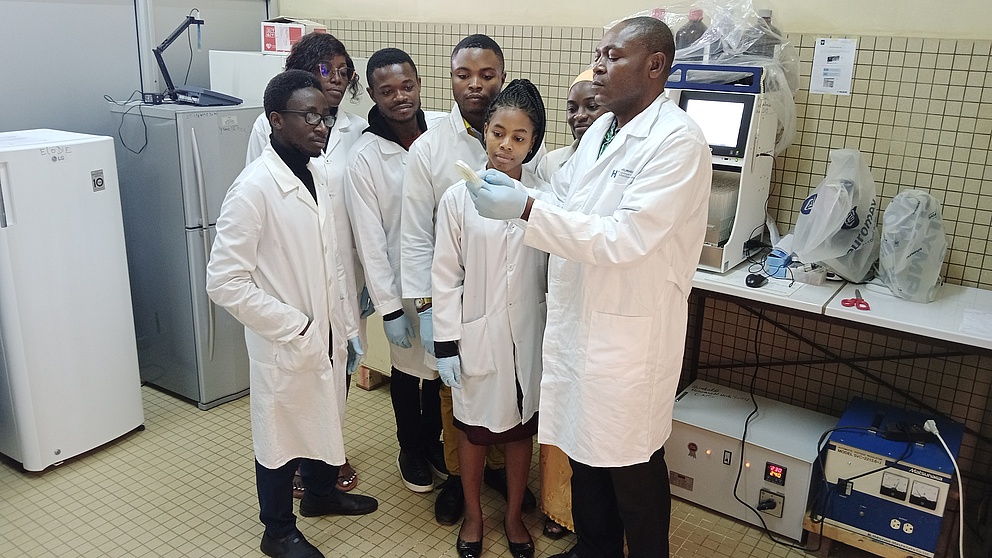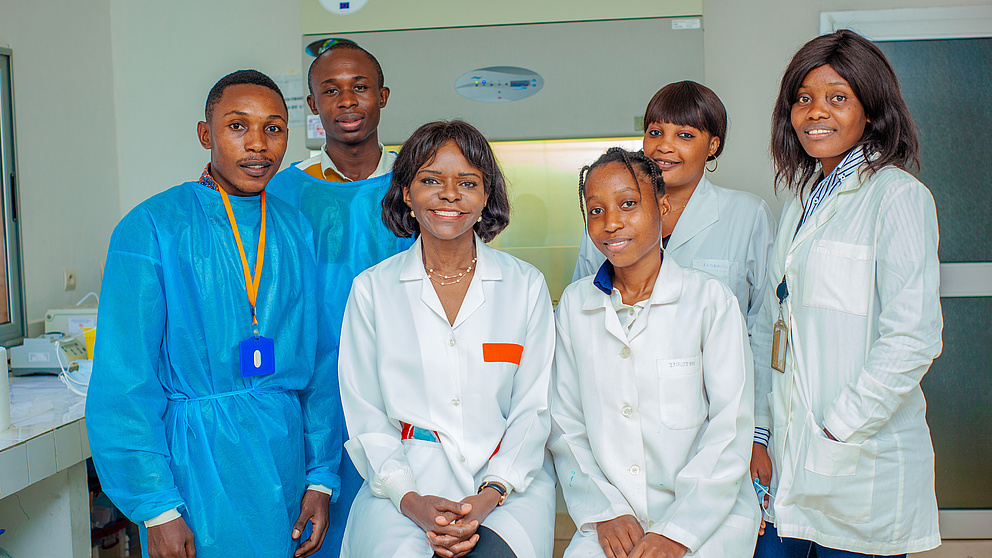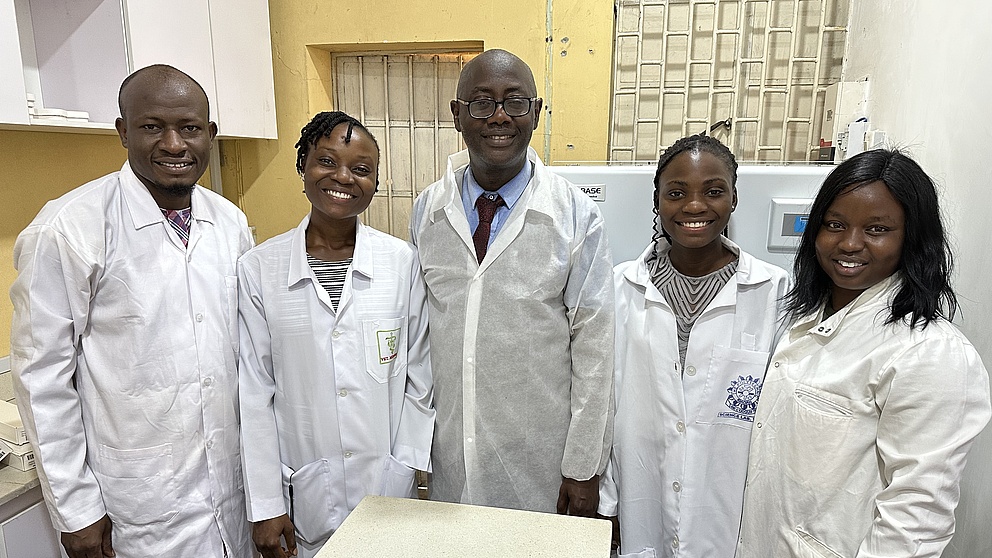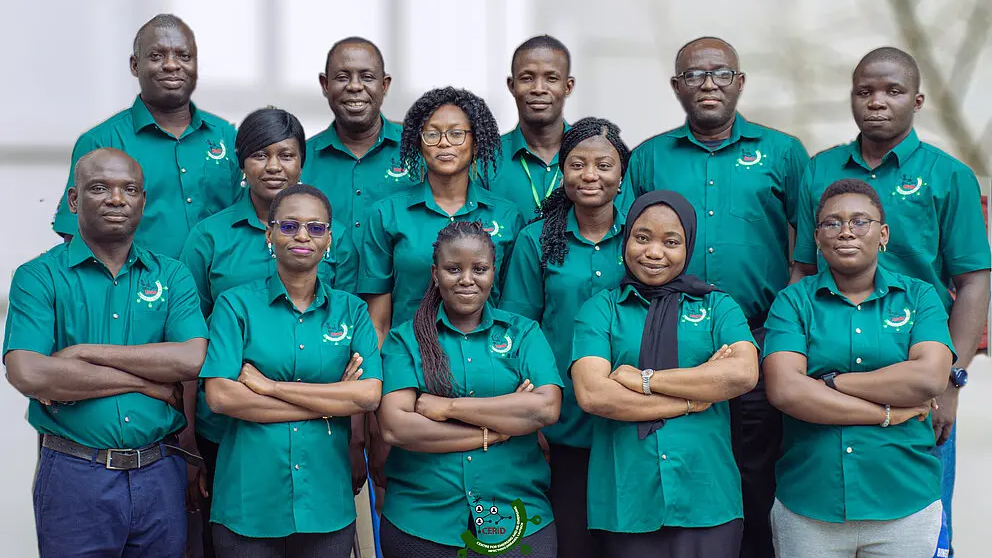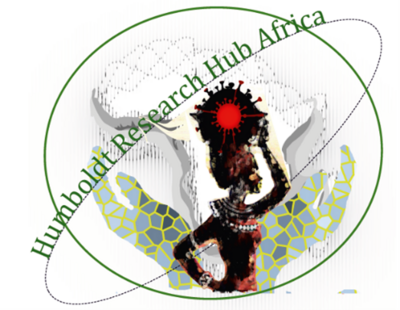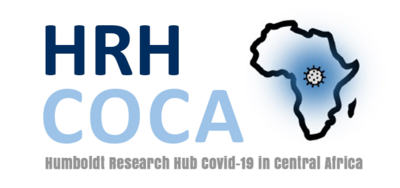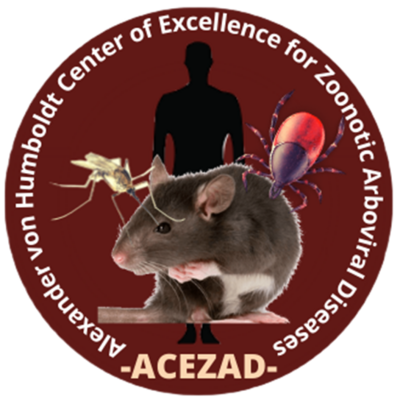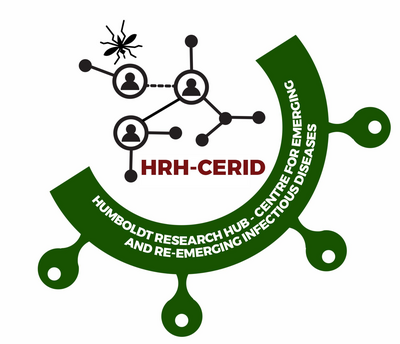Jump to the content
- {{#headlines}}
- {{title}} {{/headlines}}
Six research hubs
At the Foundation's Annual Meeting in Berlin in June 2023, the African leaders and German cooperation partners of the Humboldt Research Hubs came together to share their experiences and future collaborations. The Foundation's Secretary General Enno Aufderheide also took the opportunity to gain more detailed information about the research hubs.
Fighting pandemics with religion? How female religious actors in Africa contribute to ensuring healthy lives
This Humboldt Research Hub was established at the University of Zimbabwe in 2021. The hub is headed by Professor Dr Ezra Chitando Professor who collaborates with Professor Dr Eva Spies from the University of Bayreuth, Germany, and with Professor Dr Eunice Kamaara from Moi University in Kenya.
Professor Chitando’s Research Hub aims at developing research concepts and long-term cooperative structures, which will enhance interdisciplinary basic research on the interfaces of female religious activism and development with a focus on healthcare and gender equality. It also contributes to applied research by producing recommendations to improve the integration of social sciences in the fight against pandemics and its social effects, as well as give suggestions on how to involve female religious actors in achieving sustainable development goals.
Beyond basic research on the role of female religious actors in health care, the Research Hub is exploring models of potential partnership between social and natural scientists and women in religion that emerge from studying the responses of women in religion in Africa to COVID-19 and earlier pandemics.
The work of the Research Hub follows the hypothesis that African women in religion have capabilities and experiences that they have generated in earlier responses to pandemics/epidemics (such as HIV and Ebola) that they are now using to respond to the COVID-19 pandemic. In fighting pandemics from the grass-roots, women in religion do not only develop culture-sensitive and effective instruments to deal with health and social crises but also help to transform “their” religious tradition by creating new roles, positions and activities.
An in-depth interdisciplinary and transnational study of women’s responses will help to develop more effective strategies to combat future pandemics and will advance the conceptual work about the interfaces of religion, women’s health and care work and sustainable development.
Socio-Ecological modelling of COVID-19 dynamics in Africa (HRH-SEMCA)
The Humboldt Research Hub on socio-ecological modelling of COVID-19 dynamics in Africa (HRH-SEMCA) was established at the University of Abomey-Calavi, Benin, in 2021. The hub is headed by Professor Dr Romain Lucas Glèlè Kakaï who collaborates with Professor Dr Martin Wolkewitz from the University of Freiburg.
This Research Hub aims to play a crucial role in strategies not only to contain COVID-19, but also to prevent future pandemics. Research findings of the HRH-SEMCA are expected to guide African countries for epidemic preparedness. Furthermore, this project is expected to broaden research capacities of the Humboldt Research Hub's home institution and put new scientific findings into practice.
The overall objective of HRH-SEMCA is to assist African public health decision makers in their effort to fight efficiently COVID-19 and prevent possible future epidemics/pandemics by providing key information on the dynamic patterns of COVID-19 in the face of different pharmaceutical and non-pharmaceutical measures. Specifically, the project aims to:
- assess the socio-ecological patterns of COVID-19 spatial dynamics in Africa
- model the potential impacts of an imperfect vaccine against COVID-19 in Africa
- analyse the potential seasonality of COVID-19 in Africa taking into account the main climatic regions
- assess the dynamics of COVID-19 in the face of non-pharmaceutical interventions implemented, focusing on their impact and relevance of the timing of their implementation; and
- disseminate activities and research outputs from the HRH-SEMCA.
CEnter of Competence for the study of Antimicrobial NAtural PROducts from Fungi (HRH-CECANAPROF)
This Humboldt Research Hub was established at the Université de Yaoundé I, Cameroon, in 2021. The hub is headed by Professor Dr Simeon Fogue Kouam at the Université de Yaoundé I, Cameroon, who collaborates with Professor Dr Marc Stadler at the Helmholtz Centre for Infection Research, Braunschweig, Germany.
The HRH-CECANAPROF (Centre of Competence for the study of Natural Antimicrobial PROducts from Fungi), explores the cultures of coprophilous and soil fungi for novel antimicrobial secondary metabolites.
Thanks to the network of expert, the experience and sophisticated equipment of the German partner, the HRH-CECANAPROF will train young researchers/students on how to access hitherto unstudied fungi (coprophilous and soil fungi) and screen their cultures for novel antimicrobial secondary metabolites. It will also offer scientific training on basic microbiological techniques and fungal taxonomy, thereby reinforcing the capacity of participants on the protection and conservation of bioresources for sustainable development and the improvement of life quality. Aside from the search for new antimicrobials and other beneficial metabolites, the work program will also include the development of biocontrol agents as a secondary goal to contribute to sustainable agriculture.
Humboldt Research Hub COvid-19 in Central Africa (HRH-COCA)
This Humboldt Research Hub was established at the Congolese Foundation for Medical Research in Brazzaville, Republic of Congo, in 2021. The hub is headed by Professor Dr Francine Ntoumi who collaborates with Professor Dr Steffen Borrmann at the Institute of Tropical Medicine of the University of Tübingen, Germany, and Professor Dr Véronique Penlap Beng at the Université de Yaoundé I, Cameroon.
The Humboldt Research Hub COvid-19 in Central Africa (HRH-COCA) aims at establishing systematic evidence of the viral dynamics of SARS-CoV-2 and assess the effectiveness of vaccination in co-infected individuals. The HRH-COCA network strengthens research activities on COVID-19 and co-infections such as HIV, tuberculosis or malaria. This also includes the development of a training platform in collaboration with local initiatives such as the CANTAM network or PANDORA or CAIDERA.
The long-term objective of the Central Africa Humboldt Research Hub is to establish a multi-centre and multi-national instrument for surveillance and investigation of infectious disease epidemics and pandemics in the Central African region.
Humboldt Research Hub for Zoonotic Arbovirus Diseases (HRH-ZAD)
This Humboldt Research Hub was established at the University of Ibadan, Nigeria, in 2021. The hub is headed by Professor Dr James Olukayode Olopade who collaborates with Professor Dr Martin Groschup at the Friedrich-Loeffler-Institut in Greifswald, Germany, and Professor Dr Christian Happi at the Redeemer’s University in Ede, Nigeria.
The aim of the Humboldt Research Hub for Zoonotic Arbovirus Diseases (HRH-ZAD) is the detection and identification of endemic and emerging arboviral threats using the Benin-Nigeria-Cameroon Axis.
The HRH-ZAD investigates the occurrence of arbovirus infections (Rift Valley Fever (RVF), Crimean-Congo Hemorrhagic Fever (CCHF), West Nile Virus (WNV), Wesselsbron Virus (WV), Middelburg Virus) to determine their respective public health significance. The need for ongoing surveillance of known (endemic) and relatively unknown (emerging) arboviruses in various countries is critical due to increased animal trade and transport, bird migration, and global climatic changes that have a major impact on the incidence of these diseases due to effects on the life cycles of the transmitting vectors. The major emphasis is the development of repository and analysis of serum, plasma and tissues of wild rodents (African Giant Rat, Greater Cane Rat, Squirrels, Hedgehogs), Pangolins, Vultures and birds (Crows, Cattle Egret) etc. The research hub also involves partners from Benin (University of Abomey-Calavi) and Cameroon (National Veterinary Laboratory (LANAVET), University of Ngaoundere).
Funding for the Humboldt Research Hubs is made possible by support from the German Federal Foreign Office:
Center for Emerging and Re-emerging Infectious Diseases (HRH-CERID)
Center for Emerging and Re-emerging Infectious Diseases (HRH-CERID) is a Humboldt Research Hub established at the Ladoke Akintola University of Technology, Nigeria, in 2021. The hub is headed by Professor Dr. Daniel Olusola Ojurongbe, who collaborates with Professor Dr Thirumalaisamy P. Velavan, University Hospital Tübingen, Germany, and Professor Dr Mohamed Osman, University of Khartoum, Sudan.
CERID aims to strengthen African capabilities and systems for enabling a rapid and effective response to infectious diseases with epidemic or pandemic potential arising within the countries or those imported from overseas.
Depending on various factors, infectious diseases can spread geographically from a country, putting the rest of the world at risk. To prevent the spread of a disease with epidemic and pandemic potential, increased awareness, active disease surveillance, early diagnosis, and rapid communication of health systems to implement intervention measures are critical components. With a well-equipped laboratory and well-trained personnel, HRH-CERID shall significantly contribute to the control of emerging and re-emerging infectious diseases in Africa and elsewhere. In detail, the Research Hub’s objectives are to:
- establish and maintain a well-equipped genomic laboratory,
- conduct cutting-edge genomic research focusing on infectious diseases,
- train personnel (including postgraduate students) on current rapid technologies to detect and characterize infectious pathogens circulating in Africa,
- build human capacity that will be well prepared to handle disease outbreaks, and
- establish a biobank that meets international standards.

